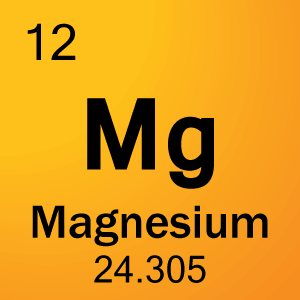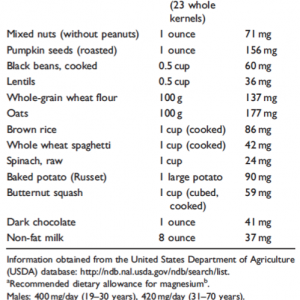 Magnesium
Magnesium
See also:
Individual Vitamins & Minerals:
Purchasing Supplements
When purchasing supplements reviewed on this web site and discussed with Dr. Ehlenberger, a discount on usual commercial pricing can be obtained by purchasing from Accurate Clinic’s online Supplement Store after acquiring the discount code from Accurate Clinic:
Accurate Clinic’s Supplement Store
or call Toll-Free: 877-846-7122 (Option 1)
Educational Resources:
Key to Links:
- Grey text – handout
- Red text – another page on this website
- Blue text – Journal publication
.
Magnesium
Magnesium is an important part of the more than 300 enzymes found in your body. Enzymes are body chemicals that helps regulate many bodily functions, including the production of energy, body protein and muscle contractions.
There is research that also indicates that magnesium is an NMDA antagonist, which means that it may be helpful in treating nerve pain, reducing the development of tolerance to opioids and slowing the development of central sensitivity, a process that contributes to the magnification of chronic pain severity.
Health Benefits of Magnesium
There are many health benefits associated with magnesium. It plays a role in maintaining a healthy heart and healthy bones. In fact, without adequate Magnesium, Calcium cannot be incorporated into bone as effectively.
- Magnesium has been shown to be effective in reducing arthritis pain, muscle pain and muscle cramps.
- Magnesium has an excellent record for reducing migraine headaches.
- Magnesium improves sleep.
- Magnesium helps anxiety and depression.
- Magnesium is important in cardiovascular health, helping to control high blood pressure and prevent diabetes.
- Magnesium is aso useful in reducing bronchospasm in asthma.
- Low dietary intake of Magnesium is associated with elevated CRP levels, a biomarker for systemic inflammation.
- Magnesium Sulfate (MgSO4), given intravenously, reduces post-operative pain and allow for reduced dosing of opioids. MgSO4 appears to increase the analgesic potency of morphine.
Magnesium Needs
Recent studies show that 70-80% of Americans diets may be deficient in magnesium.
The average person needs to consume between 300 and 400 milligrams of magnesium a day.
Foods Rich in Magnesium
Dark green leafy vegetables, fish, bran, whole grains, beans and nuts. Fresh fruits and vegetables also provide a modest amount of magnesium.
Coconut Water
First, coconut water is not the same thing as coconut milk.
Coconut milk is creamy and comes from coconut meat, while coconut water is the liquid from young green coconuts. Coconut water is low-fat, with one-half gram of fat in one cup, and a good source of fiber, magnesium, potassium and vitamin C. (The sodium content of coconut water can be high, so make sure to check the label).
Quinoa
Quinoa (pronounced KEEN-wah) is a grain native to South America. Although it is somewhat similar to other grains, it cooks faster, is higher in protein and is a good source of iron and magnesium. Since it has more protein than other grains, it is a great choice for vegetarians. The flavor of quinoa is bland so it can be used in soups or salads or on its own as a side dish. This grain can also be a great substitute for any dish that calls for rice.
Bananas
Everyone thinks of potassium when they think of bananas, but bananas also contain a significant amount of vitamin C, B6, folate, magnesium, iron and copper. A medium banana, seven to eight inches long, has 105 calories and three grams of fiber with 27 grams of carbohydrates.
Dried Figs are a good source of potassium and calcium and contain iron and magnesium.
Artichokes are high in potassium, low in calories, fat-free and contain some folate, magnesium, fiber and vitamin C.
Other sources of magnesium:
Magnesium Supplements – Oral
Based on their absorption rates, the best forms to supplement with include chelated magnesium or magnesium glycinate, citrate and ascorbate. How much magneium to supplement with will depend on individual needs. Oral magnesium can be taken up to bowel tolerance – meaning until you experience loose stool. The amount it takes to get there can vary significantly from person to person. If you experience loose stool, reduce your dosage. Another way to supplement with magnesium is by absorbing it through the skin using a topical cream compounded by a pharmacist under the guidance of your physician or by bathing with epsom salts in your bath water.
Magnesium Supplements – Topical
Topical formulations are available commercially including MagneGel™ (Designs for Health), a transdermal magnesium gel available through the Accurate Clinic’s Supplement Store. Magnesium is generally believed to be well absorbed through the skin with the use of topical preparations and should be considered for use by those sensitive to the laxative effects of oral magnesium.
Epsom Salts: Another Alternative
Question: How is it possible to get any benefit from Epsom Salt (Magnesium Sulfate) just from soaking in it? Answer: Magnesium and sulfates can be ingested from foods or mineral supplements, but both substances are readily absorbed through the skin.
Question: Is all Epsom Salt the same?
Answer: While there are various ways of manufacturing and packaging Epsom Salt, chemically all Epsom Salt is the same. The Epsom salt you buy in a container at one grocery store or pharmacy is the same as what you would find at another grocery store or pharmacy.
Question: Why is Epsom Salt called Epsom Salt?
Answer: One of the earliest discoveries of magnesium sulfate, the scientific name of Epsom Salt, occurred back in Shakespeare’s day in Epsom, England, which explains the first half of the name. The term “salt” probably refers to the specific chemical structure of the compound, although many people mistakenly assume it refers to the crystalline structure of Epsom Salt, which has an appearance similar to that of table salt. (Table salt, of course, consists of sodium chloride, so it’s an entirely different substance than magnesium sulfate).
Question: How much Epsom Salt should I use in a bath and how often?
Answer: Add 1-2 cups (or up to 20 oz or 400-600 gms) into the bath while the tub is filling. If too much Epsom Salt is added, the water may become somewhat soapy in texture. Studies suggest that most people would find maximal benefit by bathing 2 or 3 times/ week.
Question: Does Epsom Salt dry your skin and leave a residue the way sea salt does?
Answer: No. In fact, Epsom Salt is widely reported to soften skin, and it rinses away completely. If needed, add 1 to 2 tablespoons glycerin to keep your skin from drying out (more for dry skin, less for oily skin), You can also add essential oils of choice for scent if desired.
Question: Is Epsom Salt safe to ingest?
Answer: Yes – in fact, Epsom Salt is an FDA-approved laxative when taken orally.
For Internal Use as a Laxative, dissolve the following doses in 1/2 glass water:
Adults 12 years or older – 1 to 2 teaspoons.
Children 6 to 12 years – 1/2 to 1 teaspoon.
Not recommended for children under 6.
Repeat in four hours if needed.
Limit two doses per day.
Lemon juice may be added to improve taste. Follow above directions only or as directed by a physician.
Question: Is it safe for pregnant women to use Epsom Salt?
Answer: Please consult with your obstetrician.
Question: Where can I buy Epsom Salt?
Answer: Most drug stores sell it in convenient, consumer-sized packages. Look for it where you find aspirin, Tylenol or Ace bandages (because it’s used as a treatment for muscle aches) or in the laxative section (magnesium sulfate is an effective, naturally occurring laxative).
Question: There are different kinds of Epsom Salt, some sold in supermarkets or pharmacies and some that’s agricultural or technical grade sold in hardware, co-op or farm stores. How do I know what’s safe for humans to use?
Answer: Any package that has a “drug facts” box or that’s labeled “USP” has been manufactured, tested and certified to meet stringent regulatory standards that are safe and acceptable for human use. That’s true for ingesting Epsom Salt or soaking in it. Consult the package for directions.
Question: Is it safe to put Epsom Salt in my hot tub?
Answer: Yes, it should be, but please consult with your local spa dealer to confirm whether it is safe to add Epsom Salt to your hot tub or whirlpool.
Resources:
MentalHealthDaily.com
- Magnesium Deficiency Symptoms, Causes, & Treatments (excellent review)
References:
Nutritional Supplements – Overview:
Magnesium
Magnesium – new articles
- ‘Magnesium’-the master cation-as a drug—possibilities and evidences – 2021
- Bioavailability: magnesium is not just magnesium Effect of transdermal magnesium cream on serum and urinary magnesium levels in humans – A pilot study – 2017
- Magnesium – Are We Consuming Enough? – 2018
- Magnesium and Pain – 2020 Magnesium as an Alternative or Adjunct to Opioids for Migraine and Chronic Pain – A Review of the Clinical Effectiveness and Guidelines – 2017
- Magnesium basics – 2012 Management of pain using magnesium sulphate a narrative review – PubMed – 2022
- Myth or Reality—Transdermal Magnesium – nutrients-09-00813 – 2017 Myth or Reality—Transdermal Magnesium? – 2017
- Subclinical magnesium deficiency: a principal driver of cardiovascular disease and a public health crisis – 2018
- Unraveling the role of Mg in osteoarthritis – 2016
- Magnesium Deficiency Symptoms, Causes, & Treatments – MentalHealthDaily
Magnesium – Overview
- Magnesium — NIH Health Professional Fact Sheet
- Magnesium — NIH Consumer Fact Sheet
- Magnesium Metabolism and its Disorders
- Magnesium basics 2012
- Magnesium in Prevention and Therapy – 2015
- Essential elements in depression and anxiety_PartI – 2014
- Essential elements in depression and anxiety. Part II – 2015
- Myth or Reality—Transdermal Magnesium? – 2017
- Magnesium-and-Ehlers-Danlos-Syndrome Part 1 – 2013
- Magnesium-and-Ehlers-Danlos-Syndrome Part 2 – 2013
Magnesium – Anxiety
- The effects of magnesium supplementation on subjective anxiety – 2016.
- The Effects of Magnesium Supplementation on Subjective Anxiety and Stress—A Systematic Review – 2017
Magnesium – Depression
Magnesium – Fibromyalgia
Minerals
Emphasis on Education
Accurate Clinic promotes patient education as the foundation of it’s medical care. In Dr. Ehlenberger’s integrative approach to patient care, including conventional and complementary and alternative medical (CAM) treatments, he may encourage or provide advice about the use of supplements. However, the specifics of choice of supplement, dosing and duration of treatment should be individualized through discussion with Dr. Ehlenberger. The following information and reference articles are presented to provide the reader with some of the latest research to facilitate evidence-based, informed decisions regarding the use of conventional as well as CAM treatments.
For medical-legal reasons, access to these links is limited to patients enrolled in an Accurate Clinic medical program.
Should you wish more information regarding any of the subjects listed – or not listed – here, please contact Dr. Ehlenberger. He has literally thousands of published articles to share on hundreds of topics associated with pain management, weight loss, nutrition, addiction recovery and emergency medicine. It would take years for you to read them, as it did him.
For more information, please contact Accurate Clinic.
Supplements recommended by Dr. Ehlenberger may be purchased commercially online or at Accurate Clinic.
Please read about our statement regarding the sale of products recommended by Dr. Ehlenberger.
Accurate Supplement Prices
.

